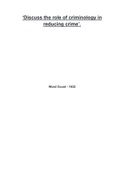‘Discuss the role of criminology in
reducing crime’.
Word Count - 1632
, Criminology is a branch of sociology which examines human behaviour, interaction and
organisation; the main goal is to understand the causes of crime. Theories produced by criminologists
generally fall into the classical, biological, psychological or sociological category; which is used to
examine and determine the root cause of criminal behaviour. Criminologists are also interested in unequal
balances of power which may produce underlying causes of crime such as poverty. There are a variety of
approaches to criminology which can be shaped by different academic disciplines (Carrabine et al.,
2014). Criminological theories often attempt to explain the unexplainable, and explain what is often the
cruelty, oppression, or even evil some employ on others (Okada, 2015).
The role of criminology in reducing crime can be summarised by looking at two main sources of
crime statistics; the police, and the Crime Survey for England and Wales, previously known as British
Crime Survey (BCS). Crime prevention is hypothesized to be a positive thing within society, however in
order for it to be positive in reality, we must understand how crime can be prevented. Understanding
prevention includes two processes; predicting the outcome of a chain of events, and then being able to
approach and intervene, therefore altering the predicted outcome (Walklate, 2016). This essay will take
the form of a literature review in order to discuss Rational Choice Theory, Modern Deterrence Theory, and
Social Control theory, which are all used by criminologists to help understand how and why crime occurs,
through the development of criminological theory, so that strategies can be designed to prevent it.
Rational Choice Theory is an economic opportunity model which has a utilitarian belief that the
decision to offend is based upon the variables of costs of the crime itself (Hopkins, 2018). Wider
influences such as environmental and situational barriers are understood to be a factor in whether an
individual will commit a crime or not. This framework can be used to analyse crime control, and ultimately
situational crime prevention (Cornish & Clarke, 1987).
The Rational Choice Theory first systemised in both the United States and the United Kingdom
during the 1970s and 1980s, when there was a noticeable rise in the crime rate. The ‘right realism’
introduced in the 1980s was targeted to highlight and inform society that crime was a problem of the
individual and not of social structure (Walklate, 2016). The concept of rationality predominantly works as
the link between the individual and the world they live in. Each individual makes a “rational choice”




